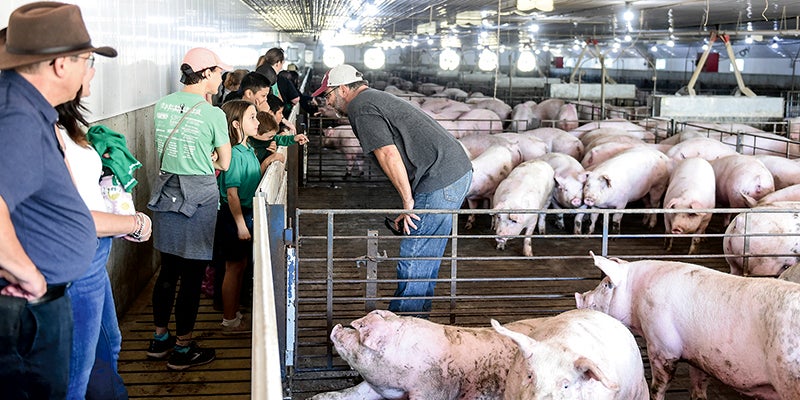SWCD Column: Getting credit for doing good on the land
Published 6:13 am Saturday, September 2, 2017

- Steve Lawler of Mower Soil and Water Conservation District talks Sept. 15 with local farmer James Anderson after a recognition ceremony at the Cotter farm near Austin for the state's Ag Certainty program. Anderson was one of four Mower County farm families certified by the state in 2016. Photo provided
By Justin Hanson
Mower Soil and Water Conservation
Mower County farmers likely are closer than they think when it comes to getting kudos from the state on what they’re doing for water quality.
Overall, Mower County’s agricultural producers and landowners are doing a good job with land management. Their efforts even might make the grade for the Minnesota Agricultural Water Quality Certification Program (MAWQCP) now in its second year.
This is a good time for us locally to send a positive message throughout the state that Mower County has many good stewards of the land and our farmers have been proactive with land-management practices that help water quality.

An Ag Certainty sign is on display at the Tom Cotter farm in Austin Township. Photo provided
Minnesota Department of Agriculture developed the MAWQCP certification program – better known as Ag Certainty – for farmers to show their conservation efforts during a time when there is too much blame being placed on them for Minnesota’s water-quality issues. A year ago, the state certified four Mower County farm families who worked with Mower Soil and Water Conservation District on an application, and our office has other families awaiting certification this year.
Ag Certainty is a voluntary initiative that reviews land-use practices of ag producers and landowners. Support staff from the state provide walkovers of farms and interview farmers about their operation.
If changes are necessary, cost-share assistance often is provided to the participating farmer through a government program. If the operation is in great shape, Ag Certainty certifies the farmer, who gets a 10-year pass on any future state regulation affecting his or her operation.
This truly is a significant incentive offered by the state.
Yet, I think the vastly more important purpose of Ag Certainty is the message it sends to those concerned with the ag community’s efforts related to water quality.
Mower SWCD is finding that many of our farmers in the county qualify for certification. Many of those farmers who don’t qualify yet still are close enough to achieve certification without making significant operational changes. And, again, cost share usually can offset those costs.
I often speak with farmers who share concerns about new regulation and potential loss of control for making on-the-farm decisions. Farmers today are concerned about how the state rolled out its new buffer law. They’re also concerned about future fertilizer management rules.
There is a perception that the general public doesn’t give farmers enough credit for their conservation efforts. The common denominator for all those concerns is education.
Farmers have a story to tell about how they manage their land, but it’s not getting heard by enough people, partly due to education being a two-way street. Some members of the public don’t want to hear the farmer’s story. I’m convinced, however, that group is small.
For the most part, the ag story isn’t getting heard because farmers aren’t telling it on enough platforms. Ag Certainty is strong way of telling that story.
This isn’t to say that we have resolved all our water-quality challenges. Our office works every day on local water-quality challenges and some of that comes directly from land-management methods that lead to extensive stormwater runoff or groundwater infiltration.
I challenge Mower County farmers to take a little time before harvest to look into Ag Certainty and how it relates to their operation. History tells me that many will qualify.
Please feel free to call or stop by the Mower SWCD office in Austin to learn more. Our staff wants to help farmers through the Ag Certainty application process and, if approved, help them tell their water-quality story.
• • •
Mower SWCD provides technical assistance to landowners with conservation practices that protect land and water resources. SWCD also performs the duties of the Cedar River Watershed District to improve water quality and reduce flooding. This monthly column by Mower SWCD/CRWD typically runs the last Thursday of each month. More information is available on the Mower SWCD and CRWD websites and Facebook pages. Questions and comments can be sent to tim.ruzek@mowerswcd.org.
• • •
Justin Hanson is the district manager of Mower Soil and Water Conservation and the administrator of the Cedar River Watershed District.




